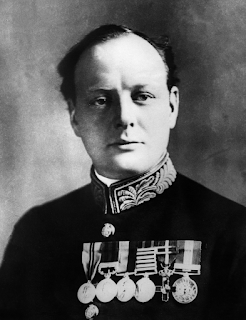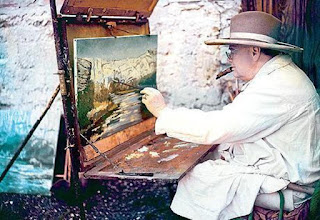Bourke Cockran and Winston Churchill
 |
| Winston Churchill c. 1950 |
While Churchill had exceptional talent for speech making, it's not true that writing and giving his speeches was an easy or effortless task. It took many years for Churchill to perfect the art of oratory.
In 1895 the young Winston Churchill made his first trip to New York. On the whole, Churchill's early trips to America (he would make fourteen in all, and his later ones were much more successful) weren't a huge success. Although Churchill's mother was from the United States, the Americans still viewed Churchill as an embodiment of colonialist mentality. Churchill talks on his adventures in South Africa during the Boer Wars gained hardly any applause (some Americans even sided with the Boers), partly owing to the fact that neither Churchill nor the Boer Wars were big topics in America.
 |
| Bourke Cockran c. 1900 |
Here he was introduced to the politician William Bourke Cockran (often just known as Bourke Cockran), who would make a lasting impression on him. Born in 1854, Cockran was an Irish-American politician who was famous for his rhetoric. Although his name is little-known today, Cockran was a political celebrity of his day. He served as a United States Representative from the East Side of Manhattan for seven terms, hated socialism, fought against high tariffs, and switched parties no less than four times. Sounds familiar? Churchill was also in politics for decades, vehemently opposed socialism, lobbied for free trade, and switched political parties twice. Churchill also read all of Cockran's speeches and studied their style and technique. "He taught me to use every note of the human voice as if playing an organ," Churchill later wrote. "I could play on every emotion and hold thousands of people riveted in great political rallies when he spoke." If you select any of Churchill's hundreds of speeches, you will most likely come across a rhetorical device that Cockran used. The use of historical allusions, facial expressions, occasional dramatic gestures, and utilization of an extensive vocabulary are just a few of the techniques that rubbed off on Churchill. Even decades later Winston Churchill would repeat some of Cockran's own phrases in his speeches.
 |
| Cockran addressing a rally in San Francisco. |
Sources:
https://en.wikipedia.org/wiki/William_Bourke_Cockran
https://richardlangworth.com/words
https://www.nysun.com/new-york/how-churchill-mobilized-the-english-language/87862/
https://www.irishtimes.com/life-and-style/abroad/the-irish-orator-who-taught-winston-churchill-how-to-win-a-crowd-1.2975643
The Churchill Factor by Boris Johnson
Churchill: Walking with Destiny by Andrew Roberts
Young Titian: The Making of Winston Churchill by Michael Shelden




Comments
Post a Comment